Assembled here are key sources that have shaped the modern Middle East, Zionism and Israel. We have included items that give texture, perspective and opinion to historical context. Many of these sources are mentioned in the Era summaries and contain explanatory introductions.
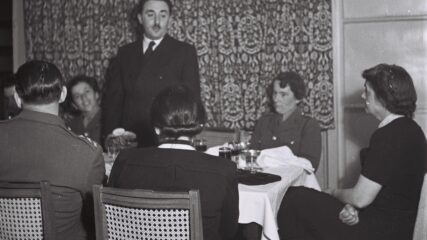
A key figure in the Jewish Agency’s political department, Moshe Shertok (later Sharett) argues for a Jewish commonwealth/state in Palestine. Pragmatically he realizes Arabs in Palestine oppose the Jewish presence, yet he rejects a potential binational Arab-Jewish state.
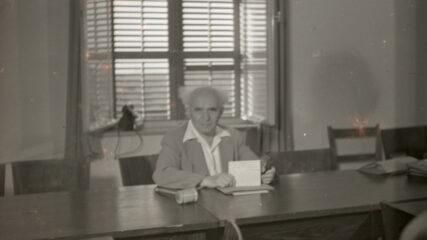
The Status-Quo Agreement is an understanding reached between David Ben-Gurion, then the chairman of the Jewish Agency Executive, and the religious parties in the period before Israel became a state.
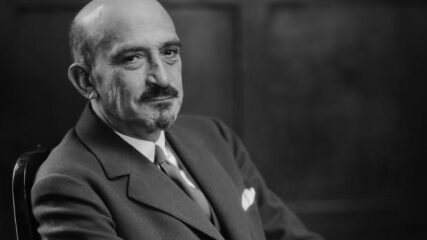
The last of 23 volumes of Chaim Weizmann’s Letters summarized wonderfully by Aaron Klieman, recalls the Israeli first president’s views of those fateful years for Zionism and Israel from 1947-1952. Chaim Weizmann died at his home in Rehovot on 9 November 1952, shortly before his 78th birthday. All of the letters read together, provide ring side seat to Zionism as an idea to the reality of the Jewish state.
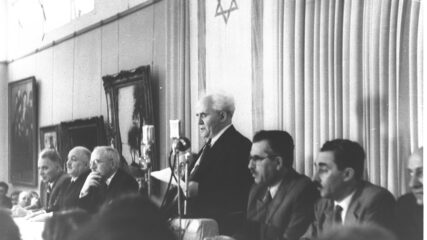
This draft spoke eloquently about protecting individual, religious, and civil rights for all. Instead individual civil rights in Israel were protected by a series of Basic Laws.
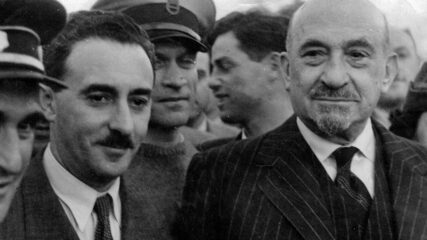
Sharett gives an overview of Israeli foreign policy, key issues, and relationships with UN and Arab states.

With crisp analysis, Haganah Commander Yigal Allon, later a Prime Minister of Israel attributes Israel’s successes to multiple factors including the absence of a centralized Arab command, limited Arab military training, underestimating the potential fighting capabilities of local Arabs, and Israel’s success in integrating its citizens into the war effort.
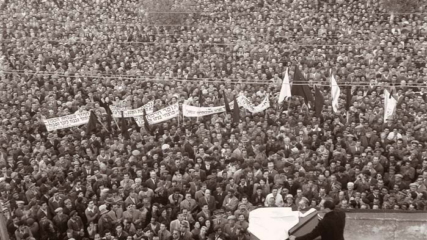
In an impassioned Knesset speech, Menachem Begin staunchly opposes accepting $1.5 billion in German reparations for Jewish deaths during WWII. No price, he believes, can be put on the lives lost.
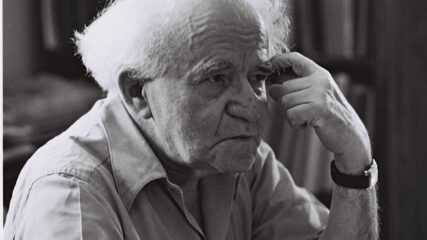
Israel’s first prime minister was a prolific writer. In this excerpt of a 50-page document, he notes that the Jewish nation’s DNA included relentless challenges marked by dispersal, ostracism and hatred by many people. Despite these adversities, Israel’s establishment symbolizes a remarkable victory against all odds — a culmination of the Jewish people’s tenacity and unyielding spirit. The state and Zionism were not remotely close to being finished, nor having succeeded in the quest for the Jewish people’s normalization.

In response to President Eisenhower’s demand that Israel leave Sinai, Prime Minister Ben-Gurion provides a detailed history of Israel at the UN and Egypt’s denial to Israel of use of the Suez Canal. He stresses Egyptian “injustice, discrimination, hostility, and boycott” imposed on Israel.

Ben-Gurion elegantly connects modern Israel from messianic redemption to Zionism, building the country through labor and immigration, with dual needs to remain actively linked to the Jewish diaspora and Jewish values through education.
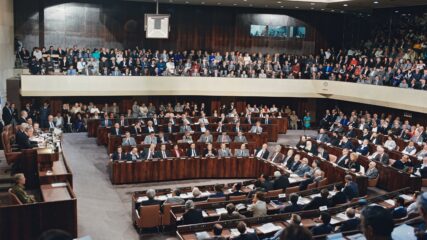
With no constitution, citizen rights and government responsibilities are stated in 14 laws. The Judiciary is covered in the Seventh Basic Law, February 1984.

With tensions on its borders, Eshkol tries to reassure Israeli public. Instead he gives a “painfully faltering” speech. Popular and party disgruntlement follow, opening the way for Eshkol to turn over the Defense Ministry two days later to General Moshe Dayan.
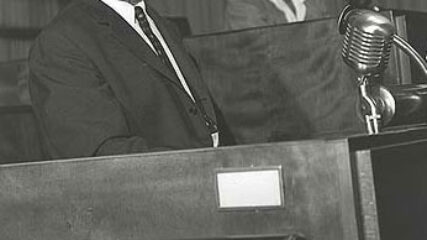
Two days after the conclusion of the June 1967 War, Eshkol, recounts the series of events that led to war, the war itself and the immediate aftermath. He reaches out to Arab states for peace seeking a path to peace with her belligerent neighbors. A week later, Israel will quietly messages Cairo and Damascus through the US, hat Israel seeks an end to the conflict. No answers are received.
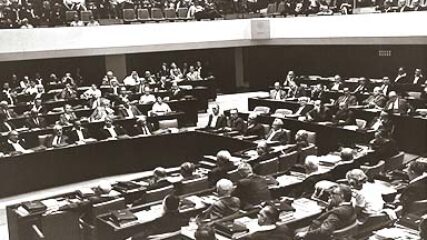
After the June 1967 war, the Israeli government sent word through the United States to Egypt and Syria seeking to jump-start a peace process. Apparently no response was received.
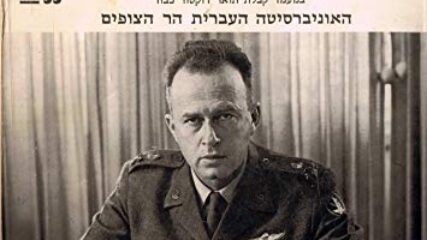
Receiving an honorary doctorate from the Hebrew University after the conclusion of the June 1967 War, Rabin delivers a speech on behalf of Israel’s entire military. He highlights the harsh realities of war yet concentrates on commending the extraordinary efforts of Israel’s armed forces.
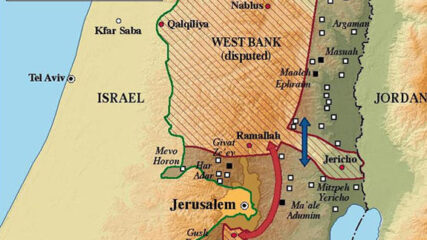
Yigal Allon’s plan for handling the areas captured from Jordan during the just-completed Six-Day War reflects Israel’s previous border vulnerability and seeks a West Bank arrangement that is not a strategic or geographic threat.

The law authorizes appointed Israeli panels to investigate matters of public concern and state interest. These independent bodies are among Israeli democracy’s most trusted institutions, but there is not mechanism in the law to require their creation.

With less than three dozen Israeli settlements in the territories taken in the June War, the proposal is not for a vast settlement increase, but for economic, infrastructure, and industrial development of the areas.

An Israeli commission of inquiry assigns responsibility to military leaders for failures before and during the Yom Kippur War. Prime Minister Meir and Defense Minister Dayan avoid direct blame but soon resign.
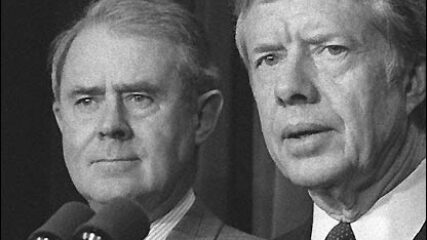
With candor, Israeli Foreign Minister Allon tells Secretary of State Vance that the Israeli Labor government would under no circumstances negotiate with the PLO until it gave up terrorism, recognized UNSC 242, and unequivocally accepted Israel’s right to exist. Only in 1993, did the PLO accept these premises, Sixteen years had then passed while Israel built settlements virtually without restraint in the territories.
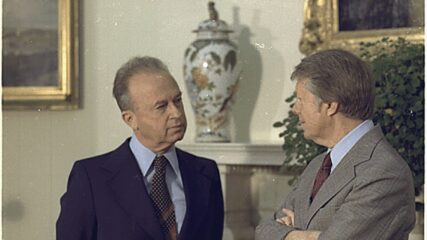
This first Carter-Rabin meeting was unpleasant at best. Rabin would not turn over Israel’s negotiating prerogatives to the US; Carter publicly told Israel that it might have to return to the June 1967 borders. Carter said Rabin was like a “dead fish.” and Rabin said that he felt ‘cornered by Carter.” His administration was interested in carving out the West Bank for Palestinian political expression even before the PLO was prepared to accept Israeli legitimacy. And Israel was not prepared to withdraw from the West Bank, a position also held by Menachem Begin.

Prime Minister-elect Begin rebukes President Carter’s assertion that Israel will need to withdraw from almost all the lands Israel secured in the June 1967 war, especially Jerusalem and the West Bank. Begin is adamant opposed to dealing with the PLO. Begin refuses to relinquish Israeli decision-making to US preferences or dictates. These fundamental policy disagreements will remain unresolved between Begin and Carter for the duration of Carter’s presidency, and years after.

Begin tells Carter that Judea, Samaria (the West Bank) and the Gaza Strip will not be placed under foreign sovereignty; likewise, these areas will not be annexed, leaving them open for possible negotiations.

After his surprise electoral victory in May, Prime Minister Menachem Begin traveled to Washington to establish a rapport with President Carter. While this initial meeting was cordial, each met the other’s stubbornness, a characteristic that would keep their relationship respectful but acrid for years to come.






















